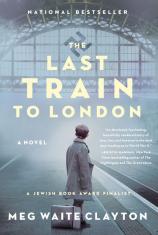The Last Train to London
Review
The Last Train to London
In pre-World War II Austria, a 16-year-old Jewish boy, Stephan Neuman, is expected to take over his father's thriving chocolate business someday, but instead he longs to be a playwright. He also has a huge crush on 15-year-old Žofie-Helene, a Christian girl who is the daughter of an outspoken newspaper editor. Despite their power, wealth and influence in the area, both families find themselves in a perilous position once the Nazis invade.
Meanwhile, a courageous Dutchwoman named Truus Wijsmuller has made it her life's mission to help Jewish children escape the Nazis. Unable to bear kids of her own with her husband, Joop, she is compelled to find refuge for as many Jewish youngsters as possible.
"Overall, THE LAST TRAIN TO LONDON is an incredibly unique, hopeful and inspirational story about a strong, fierce and determined woman."
I was fascinated by the novel's premise and enjoyed learning about how thousands of children were shuttled to safety via Kindertransport. Just like a train, the first one-third of the story unfolded slowly before gaining momentum and a more constant speed. The next third chugged along nicely, allowing me to form an affinity for each of the main characters, especially once their stories converged. Even though the book was long and detailed, the short chapters definitely helped it move along more quickly than expected, and I liked that newspaper articles were included. By the time I reached the last third, it was full steam ahead, and I couldn't put it down.
Nonfiction history buffs will appreciate Meg Waite Clayton’s meticulous research and attention to detail, while fans of historical fiction will love the personable characters, as well as the emotion poured into the story. I found the scenes at the train station, in which the parents had to say goodbye to their children, especially poignant and excruciatingly heartwrenching. As a friend explained to Truus’ husband, each child has a mother "who loves her enough to give her away." Sob. As the trains sped closer and closer to safe borders, the writing was taut and tension-filled.
Truus’ altruistic tendencies and compassion for others were awe-inspiring. As the Nazis rose to power, becoming even more aggressive, she begins to wonder if it’s true that “it’s the problems you fail to anticipate that defeat you.” Despite her doubts, the risk and danger of being caught, and hurdle after hurdle placed in her path, she never gives up and perseveres for the sake of the children: “But the impossible must be possible now; the impossible was required just to survive.”
In the end, before the trains stopped running with the advent of the war, Truus was instrumental in helping approximately 10,000 children escape Germany and the surrounding Nazi-invaded areas via trains to Britain.
"My father used to say courage isn't the absence of fear, but rather going forward in the face of it."
Overall, THE LAST TRAIN TO LONDON is an incredibly unique, hopeful and inspirational story about a strong, fierce and determined woman. Even though I’ve read numerous books set during WWII, it was a unique subject for me and definitely needs to be shared with the world.
Reviewed by Rebecca Wasniak on September 13, 2019
The Last Train to London
- Publication Date: June 16, 2020
- Genres: Fiction, Historical Fiction
- Paperback: 480 pages
- Publisher: Harper Paperbacks
- ISBN-10: 0062946943
- ISBN-13: 9780062946942




